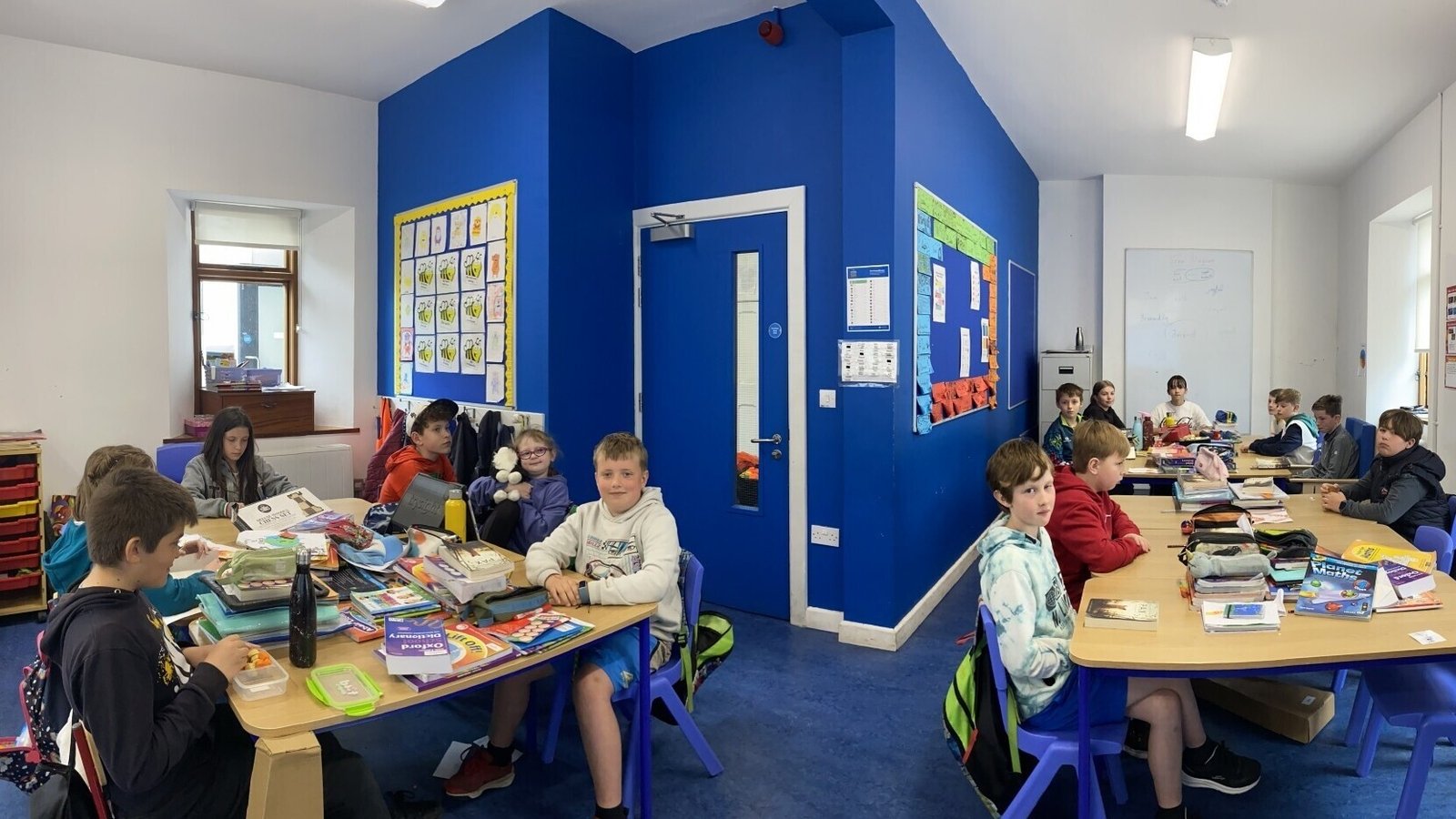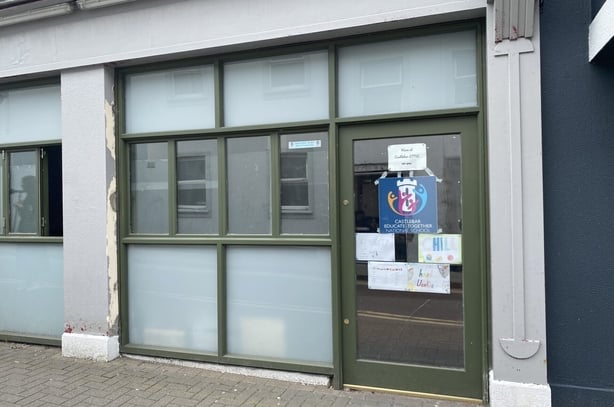World
Castlebar school appeals over ‘intolerable’ accommodation

A primary school in Castlebar, Co Mayo, has appealed to the Department of Education to purchase a site in the town as a matter of urgency so that a purpose-built school can be constructed for it.
It has also appealed for a temporary solution for next year to put an end to what it says is an intolerable accommodation crisis.
Castlebar Educate Together is currently using spaces in three different premises spread across the town.
They include two rooms in what was a café and café kitchen on a main street, three classrooms and a staffroom in a cramped and damp listed building, and two more classrooms in a mostly derelict former hat factory a ten minute walk away.
At breaktime twice a day Fifth class pupils pass through a filthy public alleyway in the town, across a main street, and along the back of a large supermarket where trucks make deliveries, to get to the school playground.
RTÉ News visited the school on Friday and saw broken glass, cigarette butts, discarded beer bottles, and human excrement in the alleyway. The children saw all this too.
The classrooms in the former hat factory are used by the school’s Junior and Senior Infant classes. They are covered by a large industrial metal shutter that needs to be lifted to give access to the rooms. It takes the children and their teachers and SNAs ten minutes to walk from the school yard at Marsh house to their classrooms.
The school has appealed to the Department of Education to find a solution that will allow all of its pupils to be educated together as soon as possible.
The 140 pupil school is just eight years old and has endured accommodation problems for all of that time.
Its establishment was delayed for a year after patron body Educate Together turned down the offer of a disused former Catholic primary school eight miles outside the town. At the time that property was described as remote, neglected and unfit for purpose.
Principal Sarah Calvey said the Department of Education then spent €500,000 renovating a listed building in the town that was never going to be suitable for the school.
Because the building is listed there were limitations on how the internal layout could be altered.
Marsh House is still the main home of the school but its classrooms are less than half the recommended size for a classroom and they have no sinks or other basic amenities that are standard in most classrooms across the country.
First, Second, Third and Fourth class children learn in three classrooms at Marsh House. In one classroom the plaster is coming off the wall due to a leaky gutter that has now been repaired and a dehumidifier is being used to reduce humidity.
Fourth class occupies a room that is an ‘L’ shape. Children sit around three tables, but pupils at two of the tables cannot see each other due to the shape of the classroom.
“The kids are very engaging and they do their best”, teacher Declan Howley said, “but it’s really difficult for them. It’s very easy for the children to switch off, to disengage from their learning because they can’t see each other. If we want to do something like circle time, we can’t do it because the children can’t see or hear each other.
“We have told them [the Department of Education] time and again for eight years that we need a new school, that we need better classrooms, but they are not listening to us”, Ms Calvey said.

Standing in a classroom in Marsh House she pointed to the damp wall and an electrical cable running across the room to the dehumidifier beside the wall. She explained that the only plugs are at the “teaching” side of the room.
“Even in summertime there is water pouring down. The dehumidifier has to run all day so there isn’t moisture in the air for the children.”
In the lobby downstairs where the school secretary works, the air feels laden with moisture. The building is so cramped that Ms Calvey says she has no dedicated office to work out of.
“Eight years ago the department told us that this was a four classroom school, but this is a half size classroom, it is 33 square metres when the recommended size is 80 square metres. The children are squashed in here”.
But the principal still describes Marsh House as their “best building”.
In the former café where Fifth and Sixth class are based, the space where Fifth class learns has no windows or any other kind of ventilation. It does have floor to ceiling glass, but this looks out on to a public way so the blinds that cover the glass are permanently drawn.
“Each time the department says that they are conducting viability studies around the town on sites. But there is no need for that to happen. We’ve told them about this site” Ms Calvey said says of the school’s interaction with the Department.
Now the school has lost patience.
The Department of Education told RTÉ News that “a capital project to provide a new permanent eight classroom school building for Castlebar ETNS” is included in the department’s school building programme pipeline.
In a statement it said: “The department has engaged the services of a Site Acquisition Manager consultancy team to identify and assess potential site options. The site on the Newport Road currently occupied by the school is included in this assessment.”
That site is the former hat factory that the school desperately wants the department to purchase.
The school has been renting the café premises from month to month for a year now.
The Department of Education has approved a plan to build one new classroom at the derelict factory site for next year.
But the school has a number of concerns. It believes such a move, without purchase of the land, is short-sighted. It also points out that it needs two classrooms not one, to accommodate its Fifth and Sixth class children.
Lastly it is concerned that construction has not yet begun and so that classroom may not be in place for next year.
It fears that next year too its children will be spread across three different premises.
On Friday, Ms Calvey joked bleakly about the name of the school, ‘Castlebar Educate Together’.
“But our pupils are not being educated together”, she said.
The school was Mayo’s first multi-denominational school and opened in the face of opposition from some locally. Now Mayo has two other multi-denominational schools, but this school remains Castlebar’s only non religious run primary school and the only one in the wider vicinity.
Ms Calvey feels the school is not being treated equally.
“You can’t grow a school if you have these difficulties”, she said, “because the school is not attractive to parents”.
‘It is not nice sometimes’
Parents at the school complain too. Apart from the conditions their children must endure – among them, no PE facilities – parents with several children attending face the impossible task of making morning drop offs in three different places at the same time. They say invariably one of their children arrives late.
Three of Nicole Morris’s four children attending the school have an added difficulty. They are visually impaired and face the challenge of having to learn new layouts as they move from one premises to another.
“It’s egregious”, Nicole said. “Joshua, my oldest, is in 6th class now. He was one of the school’s 12 pupils in its first year and he has been in three different premises. It is not fair on the children”.
Joshua said: “It is not nice sometimes. It is not that safe because we have to walk from here [the former café] to over there [Marsh House].
His classmate Adam Pothas spoke about the other temporary premises that his class had used at the start of this academic year, before the former café was found and rented. “When we couldn’t find a classroom we were in the [public] library, and then we were in another place near the garda station. I didn’t like it.”
Minister for Education Norma Foley is aware of the school’s struggle. But she will learn more on Wednesday. The school community was planning to travel to Dublin en masse to highlight its plight with a protest outside Leinster House.
But the minister told a local TD that she would meet them instead. So instead of a protest on Wednesday the school leadership will travel to Dublin alone, to meet the minister.
They say they need more than just a listening ear; they say, they need action.










